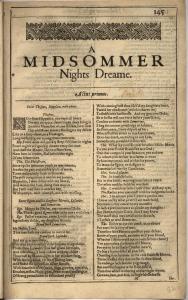
Get ready for sex and a big party! So says Theseus, Duke of Athens: “Stir up the Athenian youth to merriments.”
Now comes Egeus, unable to govern his own daughter, with a complaint. The overprotecting father is incensed about the sweet things young Lysander has done to woo his Hermia, rebuking Lysander’s “feigning voice, verses of feigning love.” He wants Hermia to marry Demetrius instead. Let me kill her if she disobeys me, Egeus tells Theseus.
Theseus tells Hermia “your eyes must with his [your father’s] judgment look.” He gives her until his own wedding date with war bride Hippolyta to make up her mind.
Hermia attempts to elope with Lysander, but she is chased by Demetrius into the woods. Helen, Hermia’s friend, chases after Demetrius, hopelessly in love, telling him “I am your spaniel.” More insightfully she adds, “We cannot fight for love as men do: We should be woo’d, and were not made to woo.”
Elf king Oberon sends his jester Puck to spread love potions around. Lysander, under the influence, falls for Helen, asking her, “Content with Hermia? No: I do repent / The tedious minutes with her have spent.”
Theater people plan a production for Theseus’s wedding. Their hope for the ladies in the audience is “not to fear, not to tremble.” They settle silly details about the play, and Quince adjourns them, saying “Come, sit down, every mother’s son, and rehearse your parts.”
Bottom plays Pyramus, who wears an ass’s head. Oberon’s queen awakes to fall in love with Bottom, who says “reason and love keep little company.”
Oberon sends Puck to fix his mistake with Lysander by making Demetrius love Helen. She thinks both men are mocking her and complains excessively.
Oberon and Puck make things right: Titania comes to her senses, Lysander loves Hermia again, and Demetrius keeps his love for Helen. Upon Demetrius explaining his feelings to Theseus, the Duke says, “These couples shall be eternally knit” in a triple wedding ceremony.
In the play-within-the-play after the wedding, Pyramus thinks his lover Thisbe has been killed, so he kills himself. Finding his body, Thisby does the same, in the style of Romeo and Juliet.
In the final scene, Shakespeare says it’s late, and tells everybody to have a good night. Wink, wink.
A Midsummer Night’s Dream is a fairly quick read, appropriate for spring or summer, with great lines about the fickleness of love. We should each read it at least once in our lives, no?